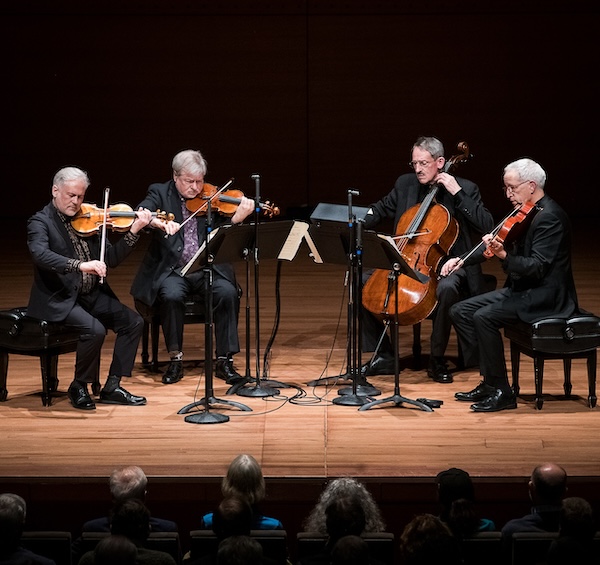Orion Quartet bids farewell with polished, cool Schubert, Beethoven

What is your ideal of what a string quartet should sound like? Chances are the Orion String Quartet came pretty close to that in its farewell concert Tuesday night at Alice Tully Hall, under the auspices of the Chamber Music Society of Lincoln Center.
On the other hand, a victory lap is not usually the one you run the fastest. Even while amply demonstrating the cohesion and polish that comes from decades of making music together, the group came up a little short on engagement with the challenging pieces they selected.
Named for the distinctive constellation, outlined by four bright stars, that dominates the winter night sky, the Orion dipped below the April horizon with two core works of the quartet repertoire: Schubert’s G major, Op. 161, D. 887, and Beethoven’s B-flat major, Op. 130, concluding with that work’s original finale, the Grosse Fuge, Op. 133.
The composers, 27 years apart in age, were nearing their own exits from life when they composed these pieces in 1826 and 1825 respectively. But the character of both works is questing and forward-looking, not valedictory.
Why, for example, did Beethoven take six movements to say what he had to say in Op. 130? Tuesday’s performance gave little clue. (Even the program note writer sounded a little surprised that he didn’t stop after four, like normal composers do.) The movements followed one another like pretty baubles on a string, with a somewhat weightier bauble—the Grosse Fuge—at the end. What was missing was a sense of dramatic tension, of unfinished business to be resolved (in different but satisfying ways) by the two finales Beethoven composed for this work.
But the evening’s exceptional beauties were not to be overlooked. From the opening bars of the Schubert, bold and mysterious by turns, the group found that sweet spot of quartet performance, four distinctive voices joined in a common purpose, the texture always shifting but never homogenized, with Timothy Eddy’s robust cello anchoring all. Fast tremolo passages in unison were impeccably coordinated and tuned.
At that point in the evening, the discretion with which the ensemble approached the first movement’s central climax or the startling “shouts” that interrupted the slow movement seemed to fit well into an exceptionally balanced and polished performance. The scherzo skipped along, punctuated by the players’ individual entrances, with X-ray clarity in the outer sections and a mellower blend in the trio.
By the time the finale arrived, with its bouncy theme flowing ahead as easily as a mountain stream over rocks, all this perfection had actually become a little tiresome. One wished somebody would take a chance with a passage, get their hair mussed a little. But one had to admire the delicacy of the group’s leggiero playing, and the gem-like clarity of its tone from forte to pianissimo.
Admirable too was the sonorous, symphonic tone of the Beethoven quartet’s opening Adagio, free of “surface noise” but with plenty of attack for the Allegro interruptions. (A discreet tap of violist Steven Tenenbom’s left shoe kept track of the ever-changing tempos.) It was a puzzling performance, but appropriately so. As Beethoven also surely intended, the Presto dazzled without answering the first movement’s questions; but a bit more of the boisterous, méchant Beethoven might have leavened the Orion’s perfection here.
A listener’s attention wandered occasionally during the gavotte-like third movement, whose intricate dialogue felt like it was going around in finely polished circles. Still another dance movement followed, this one marked “Alla danza tedesca,” although the group’s graceful, swoopy performance gave this “German folk dance” an aristocratic sheen.
All this smoothing-out of the work’s contrasts did little to set the stage for the plaintive Cavatina, the emotional turning point of this quartet, as its namesake aria typically is in an opera. Furthermore, the chamber-music ethos prevailed a little too much in this sensitive performance, the inner parts crowding the star turn of the first violin as tragic soprano—one instance where “balance” should not have been the objective.
The group could also have left smoothness and polish in the drawer for the “big fugue,” which violently resolves the ambiguities of the previous five movements with its jagged subject and bumptious triplet counterpoints. On Tuesday, clear attacks kept the music roiling as it charged ahead, but the catastrophic collapse at mid-movement was treated as just a quiet interlude, the music gathering steam again afterward without much difficulty, and the accelerando coda was downright elegant.
The group’s brilliance and skill, not to mention the “lifetime achievement” of which all present were aware, brought hearty applause at the end, to which the players responded with the Andante cantabile from Mozart’s “Dissonant” Quartet, K. 465, featuring the violinist brothers Daniel and Todd Phillips in songful duet, as an encore.
That achievement was explicitly recognized after intermission at this concert, when the CMS brass (honchos, that is, not instruments) came onstage to present the quartet’s four members—a roster unchanged since the group’s formation in 1987—with a certificate of appreciation for “extraordinary service to chamber music.” After 158 concerts for CMS alone, not to mention countless others around the world, bringing music new and old to capacity houses like the one Tuesday night, this was an accolade well earned.
The Chamber Music Society of Lincoln Center presents Stravinsky’s L’Histoire du soldat and works by Telemann, Ravel and Respighi, 5 p.m. Sunday at Alice Tully Hall. chambermusicsociety.org